If 2020 was a year of reckoning, 2021 was a year of action—and major milestones for The Cancer Letter and the cancer community.
Working from home during the pandemic did not slow us down:
- We announced the Cancer History Project,
- Launched a new state-of-the-art website, and
- Produced investigative reports on health equity issues in oncology and a series of stories on sexual misconduct.
The Cancer History Project, established to celebrate the 50th anniversary of the National Cancer Act of 1971, went from zero to 11,894 articles within one year—thanks to your readership and sponsorship—and we look forward to your continued participation and interest in building this enduring historical resource.
A list of top 10 contributors and top 25 most-read stories on CHP appears here.
Our stories on sexism and sexual misconduct in academic medicine ricocheted throughout oncology and landed on the desks of federal lawmakers:
- In May, an investigation of misconduct by Axel Grothey sparked a brush fire on social media, prompting a cascade of responses from leading healthcare organizations and institutions.
- In August, a House subcommittee demanded answers from NIH on policies to address sexual misconduct, based on our coverage.
- We invited women leaders in health care to respond in a series of editorials, and to design a roadmap for reporting harassment.
On the health equity front, leaders in oncology moved with urgency in 2021, studying the lack of diversity in the field and deploying initiatives to recalibrate institutional priorities. The Cancer Letter focused on examining solutions to inequities in academic medicine and cancer care, with support from The Commonwealth Fund and the Association of Health Care Journalists:
- Studies by leaders at NCI and the Association of American Cancer Institutes, as well as by researchers at Memorial Sloan Kettering Cancer Center, concluded that Black and Hispanic physicians and scientists are strikingly underrepresented at all levels—affirming the October 2020 findings of our first-ever survey of the leadership pipeline in oncology.
- Many cancer centers and academic health systems hired experts in diversity, equity and inclusion, added diverse faculty to their executive suites, and created DEI councils to steer equity programs that have now become part of the core mission of their organizations.
- NCI and AACI launched targeted initiatives, including leadership training programs, to build a more diverse oncology workforce. Of note, a set of new NCI mandates, which directs cancer centers to present a plan for increasing the diversity of their faculty and workforce in order to obtain (or keep) an NCI designation, go into effect this month.
Other notable stories in 2021 coalesced around two familiar themes (and a few household names in oncology): the COVID-19 pandemic, and the aftershocks of political uncertainty in biomedical and cancer research funding.
The Cancer Letter’scommitment to high-quality journalism remains unchanged, even as gridlock impedes legislative momentum in Biden-era Washington and as the omicron variant ravages communities across the nation.
We look forward to working with you on the most pressing issues in health care and oncology in the new year.
This top 25 list is compiled based on The Cancer Letter’s web analytics:
1
Prominent GI oncologist Axel Grothey was forced out of Mayo Clinic for unethical sexual relationships with women he mentored


The aftermath of sexual misconduct at premier medical institutions rarely leaves visible traces: HR is brought in, confidentiality invoked, deals made. The case of Axel Grothey’s exit from Mayo Clinic is a notable exception.
Last year, the prominent gastrointestinal oncologist was reprimanded by medical licensure boards in three states for engaging in unethical sexual relationships with an oncology fellow and a faculty colleague at Mayo Clinic Rochester, his longtime place of employment.
Three reprimands notwithstanding, Grothey has kept his appointment as co-chair of the NCI National Clinical Trials Network’s Gastrointestinal Steering Committee, an influential group that reviews ideas for clinical trials and helps determine the priorities in federally funded clinical research in GI oncology.
Related top stories:
- “1001cuts”—A GYN oncologist examines the toll of sexism in the OR (The Cancer Letter, May 14, 2021)
- As Axel Grothey becomes an emblem of sexual misconduct in medicine, many warn that the problem is bigger than one man (The Cancer Letter, June 4, 2021)
- The ocean in which we float: Harassment in oncology is pervasive—just look at the data (The Cancer Letter, June 11, 2021)
- Let’s stop passing the buck on sexual harassment in academic medicine (The Cancer Letter, June 25, 2021)
- Congressional letter based on Grothey case demands answers on NIH policies on sexual misconduct by advisors (The Cancer Letter, Sept. 3, 2021).
- NIH tells Congress it lacked authority to investigate whistleblower complaints about Axel Grothey’s sexual misconduct (The Cancer Letter, Sept. 24, 2021)
- NIH ignored my report of sexual misconduct by Axel Grothey—and danced around questions from Congress (The Cancer Letter, Oct. 1, 2021)
2
Did Vinay Prasad need to mention the Nazis to make a point on the U.S. pandemic response?


Vinay Prasad might well have made his contrarian points without invoking the specter of the Third Reich. He didn’t have to go there—but he did. Voluntarily.
Prasad, an oncologist and associate professor in the Department of Epidemiology and Biostatistics at UCSF, likes a good Twitter fight. He has incited brawls over FDA’s accelerated approval of cancer drugs, efficacy of checkpoint inhibitors, usefulness of next-gen sequencing, and—in recent months—the restrictions aimed at curbing the spread of COVID-19.
In an Oct. 2 Substack blog post, Prasad argues that public health measures may have laid the groundwork for the onset of fascism in the U.S.
Related top story:
- Arthur Caplan: Vinay Prasad’s Nazi analogy is imbecilic, ignorant, and dangerous (The Cancer Letter, Oct. 8, 2021)
3
A $250M gift creates Break Through Cancer foundation to focus five cancer centers on hard-to-treat diseases


Five academic cancer centers have formed a unique research alliance, Break Through Cancer, to focus on four cancer types—pancreatic cancer, ovarian cancer, glioblastoma, and acute myelogenous leukemia.
The founding members of Break Through Cancer are Dana-Farber Cancer Institute, the Sidney Kimmel Comprehensive Cancer Center at Johns Hopkins, The University of Texas MD Anderson Cancer Center, Memorial Sloan Kettering Cancer Center, and the Koch Institute for Integrative Cancer Research at MIT.
4
Karen Knudsen named CEO of the American Cancer Society


Karen E. Knudsen was named CEO of the American Cancer Society and its advocacy affiliate, the American Cancer Society Cancer Action Network.
Knudsen is the executive vice president of Oncology Services and enterprise director for Sidney Kimmel Cancer Center at Jefferson Health, a member of the NCI Board of Scientific Advisors, president of the Association of American Cancer Institutes, and a member of the board of directors for the American Association of Cancer Research.
She will take over as the ACS CEO on June 1, replacing Gary Reedy, who is leaving after having headed the society since 2015
5
Optimize the dose: An optimal step forward for FDA


“We are going to start making this a requirement”, stated Richard Pazdur, MD during STAT’s ASCO Recap on June 9, 2021.
The “this” may be a watershed moment for patients with cancer and oncology as a field. It was in regard to the FDA’s requirement that Amgen conduct a randomized clinical trial comparing the labeled dosage (960 mg daily) of the recently approved KRAS inhibitor sotorasib to a 75% lower dosage (240 mg daily).
6
Cheryl Willman named head of Mayo Clinic Cancer Programs, director of cancer center


Cheryl Willman was named executive director of Mayo Clinic Cancer Programs and director of Mayo Clinic Comprehensive Cancer Center. Her transition to Mayo will occur sometime in August, officials said.
Willman has served as director and CEO of the University of New Mexico Comprehensive Cancer Center for 20 years, the longest uninterrupted stint for any NCI cancer center director in the U.S. today.
7
CTCA leaves Tulsa and Philadelphia; Tulsa move comes amid Blue Cross cost-cutting moves


In recent weeks, the privately held Cancer Treatment Centers of America has sold the assets of its Philadelphia hospital and closed its hospital in Tulsa.
In Tulsa, CTCA was caught in a larger battle between Blue Cross and Blue Shield of Oklahoma and the state’s healthcare providers, including OU Physicians and St. Francis Health System, both of which are being phased out of the network.
8
What are you reading in 2021?


Are Ibram X. Kendi, Charles Dickens, and Nobel Laureate Paul Nurse on your bookshelf, too?
These are a few of the authors your colleagues are reading in 2021.
A diverse panel of clinicians, basic scientists, early-career faculty, and regulators submitted their book recommendations to The Cancer Letter for the second year in a row.
9
Rogue drugmaker first inflates the price of lomustine, then says No to Medicare coverage


Over the past year, we have witnessed the awesome power of American pharmaceutical and biotechnology companies.
With unprecedented speed, at least three different U.S. companies created vaccines that will significantly curtail the spread of a deadly global pandemic.
Yet, while some headlines nearly deified these pharma giants, a darker story about the power of American pharmaceutical companies was unfolding in the world of brain cancer.
10
Paskett: A three-time cancer survivor should not get COVID-19, but I did


Cancer patients and survivors should not get COVID-19. A three-time cancer survivor should definitely not get COVID. But I did. And it was not good. Here is my story and the lessons I learned that might be of value to others.
I had been sequestered at home—working and supervising my staff of about 40—since March 16, wearing a mask on the rare occasion I ventured out of the house, washing my hands when packages arrived and when returning from trips out of the house.
11
Cancer groups urge CDC to prioritize cancer patients for COVID-19 vaccination


The American Cancer Society, the Association of Clinical Oncology, and the American Association for Cancer Research are calling on the Centers for Disease Control and Prevention to give cancer patients a higher priority amid the rollout of vaccines against SARS-CoV-2.
In a Dec. 18 letter to the CDC’s Advisory Council on Immunization Practices, leaders at ACS and ACO cite “compelling data that shows worse COVID-19 outcomes” in patients with cancer and people with a history of cancer.
12
Elihu H. Estey: Leukemia expert, statistician, gentle soul and friend


Prof. Elihu (Eli) H. Estey, MD, a pioneering AML researcher, physician and scholar collapsed and died unexpectedly on Oct. 8 at his home in Seattle. He was 75.
Eli grew up in Brooklyn, New York, attending Poly Prep Country Day School, where he believed a major part of the development of his critical thinking took place. He and Robert Peter Gale lived two blocks apart and frequented the same afterschool candy store.
13
Biden’s budget request for NCI would set back Sharpless’s goal of raising R01 paylines to 15%


True, President Joe Biden is proposing the largest-ever funding increase for NIH, with a substantial percentage of funds going toward cancer.
Alas, cancer researchers who have been funded by NCI are unlikely to benefit from this windfall, should it materialize. Most of the new money—$6.5 billion—would go to the Advanced Research Projects Agency for Health, or ARPA-H, and NCI is slated to get a less-than-jaw-dropping 2.7% increase in fiscal 2022.
Related top stories:
- Robert Vonderheide: Building on the legacy of the Beau Biden Cancer Moonshot (The Cancer Letter, Feb. 5, 2021)
- Bidens call for $6.5B in ARPA-H funding during National Cancer Research Month (The Cancer Letter, May 28, 2021)
- ARPA-H would launch 1,000 drugs, Eric Lander promises NIH advisors (The Cancer Letter, June 18, 2021)
- Future of Biden’s ARPA-H murky as second CR delays FY22 appropriations (The Cancer Letter, Dec. 10, 2021)
- Sharpless: NCI paylines to drop amid continuing resolution and federal budget uncertainty (The Cancer Letter, Dec. 10, 2021)
14
Chernobyl: a 35 year follow up on long-term health effects


In the early morning of April 30, 35 years ago, I was awakened by a call from Anatoly Dobrynin, a long-time Soviet Ambassador to the United States.
He said General Secretary Mikhail Gorbachev wanted me to come to the Soviet Union to help treat victims of the Chernobyl nuclear power facility accident. I had cabled Gorbachev a few days earlier, offering my assistance.
15
The unKOOL, unfiltered history of menthol cigarettes


Quick, what color is menthol?
No, it’s not green. That’s the color of the KOOL, Newport, or Salem cigarette pack. Get it? Green is cool. Red is hot.
Menthol, a component of peppermint oil, is a colorless topical pain reliever like Novocain that the dentist uses to numb a tooth.
Related top story:
- Menthol ban has been a no-brainer for decades—will it finally happen? (The Cancer Letter, May 7, 2021)
16
Wafik El-Deiry: Books that mattered to me this year


Over the past year, I noticed several books written by giants in our field, people everyone knows, people I am honored to know personally. I was interested in what they wrote, and I thought their books would be of general interest to The Cancer Letter community.
Going beyond merely recommending the books, I set out to write in a book review format, providing critiques that would enable everyone to appreciate more of the details (and want to read the books).
17
The Duma Lab seeks to change how mentorship works for underrepresented women in medicine


Robust and effective mentorship is imperative to building a successful career in academic medicine.
A mentor can help shape and define the trajectory of one’s career, yet it is well known that historically underrepresented groups have great difficulties in finding mentorship and sponsorship in academic medicine.
18
Biden administration blocks Trump’s last-minute appointees from getting on NCAB


On Dec. 8, 2020, a month after losing the election, then-president Donald Trump announced his intent to name 26 people to advisory boards across the federal government.
Among them were three would-be members of the National Cancer Advisory Board, and in the months following, these three appointments—which have been blocked and ultimately terminated by the Biden administration—have plunged NCI into unfamiliar political terrain.
19
Jill Biden signals White House resolve on cancer research: “This is the fight of our lives”


Jill Biden stopped by at NCI earlier this week to reaffirm the Bidens’ pledge to “fight cancer as we know it”—an early signal that cancer research is near the top of the national agenda at the Biden-Harris White House.
“I want you to know, I want to just say it again, the president and I stand with you,” the first lady said in a Feb. 3 live-streamed Zoom call. “This is the fight of our lives, and we will never stop working to end this disease. And together, I know that we’re going to go farther than ever before.”
20
St. Jude’s $11.5B, six-year plan aims to improve global outcomes for children with cancer and catastrophic diseases


Small dreams have no power to move hearts, and in a new six-year strategic plan, St. Jude Children’s Research Hospital is thinking very big.
What would it take to drastically increase cure rates for childhood cancer worldwide?
St. Jude’s answer: $11.5 billion and an additional 1,400 jobs.
21
Texas anti-abortion law triggers resignation of two members of CPRIT’s top scientific review board


A Texas law that bans all abortions after six weeks of pregnancy—and a Supreme Court order that allows the state law to take effect—is having an impact on cancer research in the state.
Two members of the highest-level review board of the Cancer Prevention and Research Institute of Texas have submitted their resignations from the board of the state-funded institute.
22
Fox Chase gets three-year no-cost extension as director Fisher departs


God did not intend directors of NCI-designated cancer centers to last in their jobs forever.
They move on to become deans, vice deans, associate vice deans and such. Some return to the lab, clinic, classroom, or all three. Others genuinely retire, or retire in place, with emeritus titles and sets of golf clubs. Still others move on to run other cancer centers or take jobs in the industry or nonprofits. A few become NCI directors.
Very few are asked to turn in their company cell phones and laptops, lose email access, and receive immediate assistance with packing their offices. A few days ago, Richard I. Fisher, president, CEO, and director of Fox Chase Cancer Center, was relieved of his duties at the institution he ran since 2013.
23
Robert Stone: City of Hope aims to transform cancer care nationally through new models, partnerships


City of Hope has received a $50 million gift for a 190,000-square-foot outpatient center in Irvine, Calif.
As a result of the gift, from Lennar Foundation, an offshoot of a building company, the facility, which is slated to be opened in 2022, will be named Lennar Foundation Cancer Center at City of Hope Orange County.
City of Hope is investing $1 billion to develop an 11-acre campus at the Orange County FivePoint Gateway in Irvine, Calif. Separately, a new City of Hope specialty hospital on the Orange County campus is expected to open in 2025
24
To combat health disparities in communities of color, City of Hope recruits its most diverse class for leadership training in 2021


As a comprehensive cancer center in Los Angeles, City of Hope serves one of the most diverse—and vulnerable—patient populations in the United States.
Located in Duarte, approximately half an hour northeast of downtown Los Angeles, City of Hope serves more than 90,000 patients each year, many of whom are residents in underserved communities that surround the city.
In many communities immediately east and south of Duarte, 25% or more of residents lack a high school education, and 30% or more of residents live in poverty.
25
David M. Livingston, Dana-Farber scientist and former BSA chair, dies at 80


David Morse Livingston, a Dana-Farber Cancer Institute scientist who made key discoveries and forged novel collaborations that opened new paths in cancer science, died suddenly Oct. 17. Livingston was 80.
In the near half-century that he spent at Dana-Farber, Livingston held numerous high-level posts and served as a valued mentor to myriad students and junior scientists, including Nobel laureate William G. Kaelin Jr.









